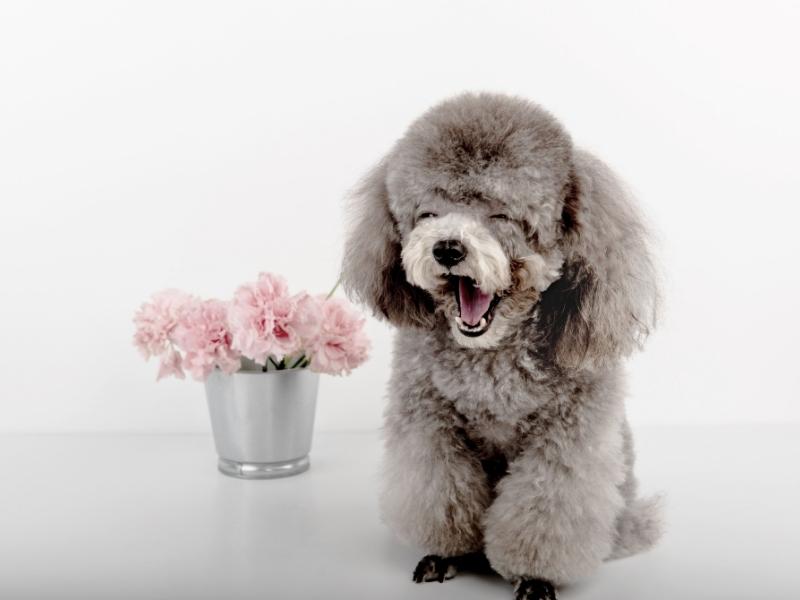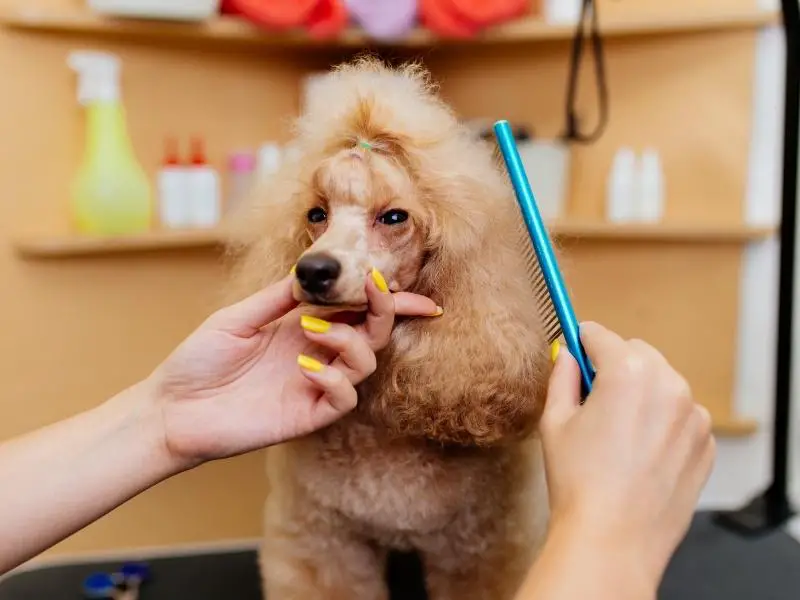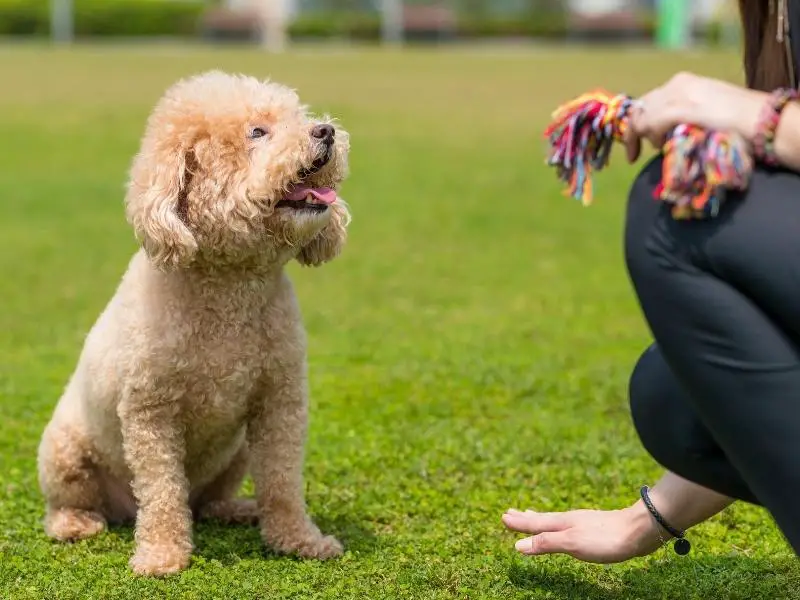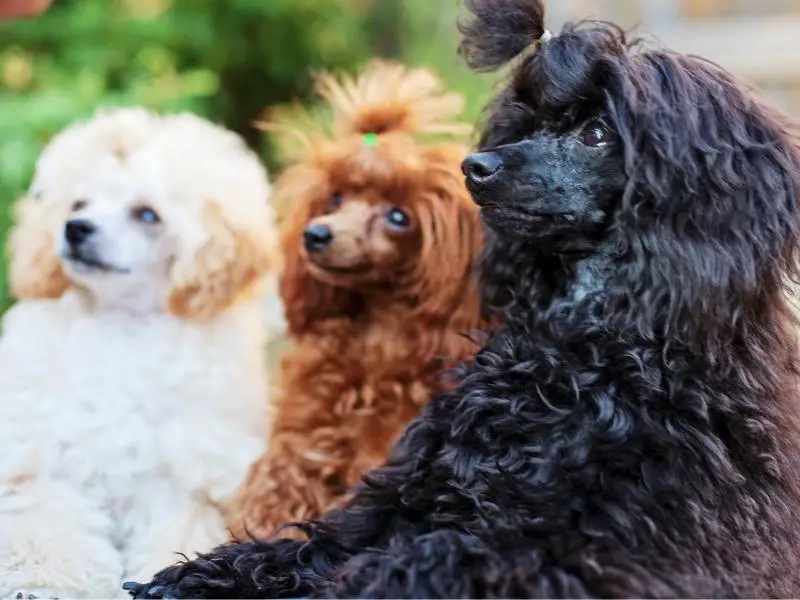The poodle is a non-sporting dog of German origin and is bred in three sizes: miniature, toy, and standard. Standard poodles are the most common and are sometimes called French poodles.
Poodles are affectionate dogs, but they need a lot of love and attention, so people who don’t have much time to devote to a dog should consider a different breed.
Poodles are easy to train if the owner has enough time and commitment.
They typically cost between $500 and $2,000.
TABLE OF CONTENTS
Poodle Characteristics & Overview

From Adobe Stock
| Common names: | Poodle, French poodle |
| Origin: | Germany |
| Breed group: | Non-sporting dog |
| Size: | Medium |
| Height: | 18–22 inches |
| Weight: | 60–70 pounds (male), 40–50 pounds (female) |
| Colors: | Black, white, sable |
| Coat: | Single, curly coat |
| Life expectancy: | 12–18 years |
| Temperament: | Loyal, friendly, playful |
| Shedding: | Mild, infrequent |
| Barking tendency: | Frequent, noisy |
| Cost: | $500–$2,000 |
Origin & Purpose
Poodles were originally bred in Germany, but the first poodle was registered with the Kennel Club in England in 1874. These dogs arrived in the United States a few years later, with the first poodle being registered with the American Kennel Club (AKC) in 1886.
They were initially bred to be hunting dogs, who were expected to retrieve ducks and birds out of pools of water, hence their German name, pudel, meaning to splash.
Life Expectancy
The average expectancy for a poodle is 12–18 years. This breed is susceptible to cancer and heart disease. To protect against these and other diseases, feed them a healthy diet of good quality dog food and avoid high-fat table scraps.
Regular check-ups will allow the vet to detect these conditions early and help to prolong the dog’s life, along with regular and energetic exercise.
Poodle Appearance

From Adobe Stock
The poodle is an elegant-looking dog with a long neck, straight back, and a square frame. This dog has floppy ears, a long, pointed muzzle, and long legs that put a lively spring in its step.
Height & Weight
Standard poodles are considered medium-sized dogs, with a height at the withers of 18–22 inches. Males, at 60–70 pounds, are heavier than females, who typically weigh 40–50 pounds.
Smaller than standard poodles, miniature poodles have a height of 12–15 inches and a weight of 12–20 pounds.
Toy poodles are the smallest of the breed, with a height of 8–10 inches and a weight of 6–9 pounds.
A standard poodle puppy weighs 15–18 pounds at three months old, reaching its full adult size at one year old.
Colors
Poodles are typically black, white, or sable-colored, with black being the most common color. Many are black as puppies or young dogs, but turn gray as they age.
They also come in other colors like gray, café au lait, silver, cream, and red. Patches of color on a poodle are rare, but occasionally present.
Apricot is the rarest color and is caused by a recessive gene.
Coat
Poodles have a single coat of short, thick, curly hair that feels soft and wooly. Shedding is light and infrequent.
Tail
In the United States, poodles are expected to have docked tails to comply with the breed’s classification requirements.
Docking is done at three days old, leaving no scarring or visible evidence. In the European Union, docking was officially banned in 1998.
Personality & Temperament

From Adobe Stock
According to the AKC temperament guide, poodles are proud, dignified dogs with an active nature. They are affectionate, highly intelligent, and outgoing.
These dogs are sociable and enjoy human interaction, making them good family dogs for households with children. However, they have a tendency towards anxiety and need gentle handling initially, until they are used to family members.
As a friendly dog, this breed gets along well with other dogs and will do well in a multi-dog household. Introduce the poodle to the other dogs gradually and under supervision, so that it doesn’t become aggressive.
Because they are so energetic, these dogs need a lot of exercise and aren’t suitable for sedentary people who don’t have enough time or energy to walk often.
Barking
Poodles tend to bark frequently when they’re bored or left alone for long periods. This barking is loud and high-pitched.
They can be trained to bark less by offering a distraction every time they start barking. Taking these dogs for long, brisk walks at least twice a day and paying them a lot of attention helps to control barking.
Excessive barking is sometimes a sign of distress. If excessive barking is happening, check for any possible health issues and try to eliminate any causes of stress.
Poodle Care

From Adobe Stock
Poodles require a moderate amount of care. Apart from basic needs such as food and water, they need to be walked at least twice a day, brushed regularly, and groomed professionally every 4–6 weeks.
Food Needs
Poodles need feeding twice a day — first thing in the morning and early in the evening. Food can be either home-cooked or store-bought. It’s important to ensure that Poodles are provided with a well-balanced diet that includes protein, healthy grains, and vegetables.
With both types of food, dogs of this breed should always have a bowl of fresh, clean water available and they should be encouraged to drink a lot.
Grooming Needs
Poodles need careful attention when it comes to their grooming needs. Use a slicker brush to brush their coat, preferably daily, but at least twice a week if daily brushing isn’t possible, as
These dogs have thick, curly hair that becomes matted quickly and easily.
Because of their hair type, they should be groomed and clipped professionally every 4–6 weeks. There are many styles of clipping, depending on personal preference and weather.
Exercise Needs
Poodles are active, energetic dogs that need 20–30 minutes of exercise each day, so this dog isn’t suitable for people who aren’t able to walk a dog daily.
This breed enjoys running freely, so try to find a dog park or a safe, open space where dogs can run around.
Mental Needs
Poodles are playful dogs that enjoy human interaction and need daily playtime.
Households with children are a good fit for this breed because they enjoy playing with energetic kids.
Toys like balls, ropes, squeaky toys, and chewy toys help keep a poodle entertained and content, as these dogs tend to get bored when they lack stimulation.
Common Health Concerns
Poodles have numerous common health issues. According to the PDSA (People’s Dispensary For Sick Animals), poodles are prone to certain cancers, hip problems, heart problems, eye issues like cataracts and dry eyes, brain disorders like epilepsy, and spinal conditions like intervertebral disc disease, among others.
Regular exercise prevents hip and spinal problems from developing. A healthy, nutritious diet and keeping vaccinations up-to-date contribute to the dog’s overall well-being and help prevent disease.
Regular vet check-ups help detect health problems early, giving the best chance of successful treatment if your dog does become sick.
Training

From Adobe Stock
Poodles are fast learners and can remember and learn to obey new instructions quickly, making the breed easy to train.
The biggest challenge in training arises from the breed’s high intelligence, which causes them to become bored easily and need variety in training activities.
Puppy phases are very important, so early training and consistency are helpful. Teach a poodle puppy to respond to its name as early as possible.
Poodle Price

From Adobe Stock
Poodles are expensive dogs. Breeding these dogs is costly, so buying from a reputable breeder costs more than adoption.
How Much is a Poodle?
A poodle typically costs $500–$2,000. The price varies depending on the dog’s color, as some colors are rarer than others and are more difficult to breed.
Reputable breeders charge more for poodles because the number of litters bred per year should be limited.
Adopting an adult dog from a shelter is cheaper than buying a puppy from a breeder, but a rescue dog may show aggressive tendencies due to previous neglect or abuse.
How Much Does it Cost to Own a Poodle?
Owning a poodle costs, on average, $150–$200 a month for food, vet’s bills, and grooming. This amount varies according to the size of the dog, as a bigger dog will require more food and greater grooming costs.
Is This Breed Right for You?

From Adobe Stock
Poodles are great dogs and many people enjoy having them. However, they may not be the most suitable dog for every pet owner depending on circumstances and lifestyles.
Who Should Get a Poodle?
Poodles are affectionate, loyal dogs that thrive in a warm, loving environment. They do well in households with children because these dogs enjoy the attention that children give them.
This breed needs a lot of exercise and needs an owner who is willing to walk the dog regularly so active, energetic people make good owners.
Regular grooming and check-ups at the vet, which are essential for poodles, are expensive. A potential owner needs to be prepared to spend money on maintaining the dog’s coat and general health.
Who Should Not Get a Poodle?
Because poodles are such intelligent dogs, they get bored easily and need a lot of stimulation and attention. This breed is not suitable for an owner who doesn’t have enough time or energy to devote to walking and playing with the dog often.
They also aren’t suitable for anyone who wants a cheap pet, as keeping these dogs is expensive.
Poodle Mixes
Poodles have been crossbred with other breeds over the years to create beautiful and interesting designer breeds. If you like this breed, you may be interested in the following mixes:







Be the first to comment